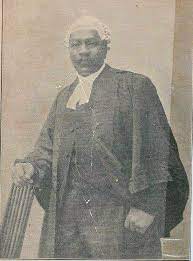Success Stories
Meet Nigerian First Lawyer: Christopher Alexander Sapara Williams
In the annals of Nigerian history, one name shines brightly as a pioneer and trailblazer in the field of law. That name is Christopher Alexander Sapara Williams. This man broke barriers and achieved greatness, He would go on to become not only Nigeria’s first lawyer but also a symbol of excellence and determination.
This article will provide simple and clear information about Nigeria’s first lawyer that you should know.

Biography
Williams was born on July 14, 1855. He was from Ijesha and was born in Sierra Leone. He studied Law in London at the Inner Temple and became a lawyer on November 17, 1879, and started practicing law in Lagos Colony on January 13, 1888. Williams was known for his exceptional skills as an advocate and his deep understanding of unwritten customary law. He joined the Nigerian Bar Association on January 30, 1888, and served as its Chairman from 1900 to 1915.
Although Williams was the first Nigerian to formally qualify as a lawyer, he was not the only one practicing law. Prior to 1913, there weren’t enough skilled lawyers available. As a result, people with basic education and some understanding of English law were chosen to work as attorneys.
Legal Career
From an early age, Sapara Williams displayed exceptional intelligence and a keen interest in the pursuit of justice. He embarked on a journey that would shape the legal landscape of Nigeria and lay the foundation for future generations of lawyers.
Upon his return to Nigeria, Sapara Williams wasted no time in making his mark. He was called to the English Bar in 1879, becoming the first Nigerian to be admitted to the English Bar. This accomplishment was not only a personal triumph but also a significant milestone in Nigerian legal history.
Sapara Williams used his newfound legal knowledge and expertise to champion the rights of his fellow Nigerians. He became a prominent advocate for justice, fighting against oppression and inequality. His dedication to the cause earned him the respect and admiration of many, both within Nigeria and beyond.
In addition to his legal career, Sapara Williams was also a man of many firsts. He was the first Nigerian to be appointed as a Justice of the Peace and the first Nigerian to be appointed as a Notary Public. These achievements further solidified his position as a pioneering figure in Nigerian law.
Christopher Alexander Sapara Williams left a lasting legacy that continues to inspire generations of lawyers in Nigeria. His contributions to the legal profession and his unwavering commitment to justice will forever be remembered.
Political Career
Sir Sapara Williams served as a member of the Legislative Council from October 1901 until his death in 1915. In 1903, there was a crisis regarding toll payments by traders, and Governor William MacGregor sought the opinions of Williams and other indigenous leaders. They favored retaining the tolls to maintain harmony with the rulers. Williams proposed adjusting the boundary between the Colony and Protectorate of Southern Nigeria and the Protectorate of Northern Nigeria, aiming for administrative convenience in 1904.
During his visit to England, he suggested policy changes to the Colonial Office, such as establishing teachers training colleges in Lagos. Williams challenged the Seditious Offenses Ordinances of 1909, emphasizing the importance of freedom of the press and expressing concerns about the potential misuse of sedition charges. He also encouraged Herbert Macauley to organize opposition to colonial practices. When Northern and Southern Nigeria merged in 1914, Williams became one of the two Nigerian members of the new legislative council, led by the Governor. He passed away on March 15, 1915.
Death
Death arrived on March 15, 1915. Afterward, Pa Tunji Gomez, a legal expert from Nigeria, disclosed that Sapara-Williams was buried at Ajele Stadium, which was being used as a cemetery.
The stadium also held the remains of other individuals, including Bishop Ajayi Crowther. However, a situation arose years after the burial when there was a legal dispute involving the military governor of the state and Ajele Stadium. The government decided to dig up the bodies buried there to create space for other constructions. Initially, nobody dared to challenge the military authorities until Pa Gomez stepped forward with the late lawyer’s daughter, Madam Sapara, who was approximately 70 years old and concerned for Gomez’s safety. They successfully obtained a court order that prevented the Lagos State government from exhuming the bodies.
In conclusion, As we celebrate the life and achievements of Christopher Alexander Sapara Williams, let us remember him not only as Nigeria’s first lawyer but also as a symbol of resilience and determination. His story serves as a testament to the power of education, perseverance, and the pursuit of justice.
